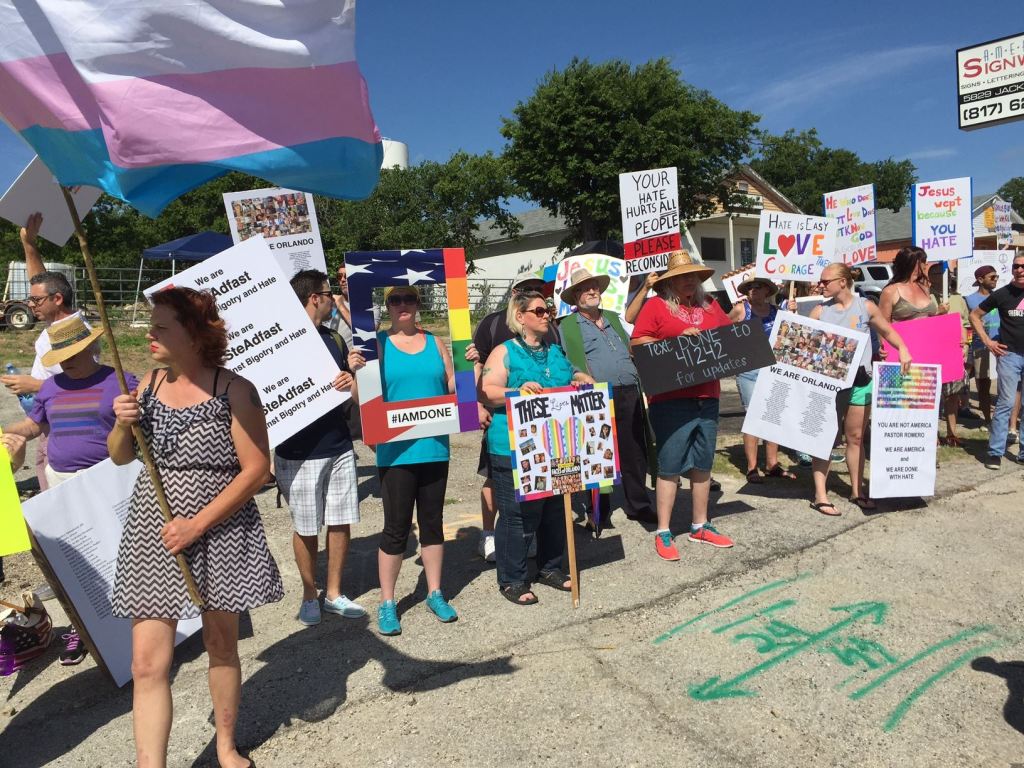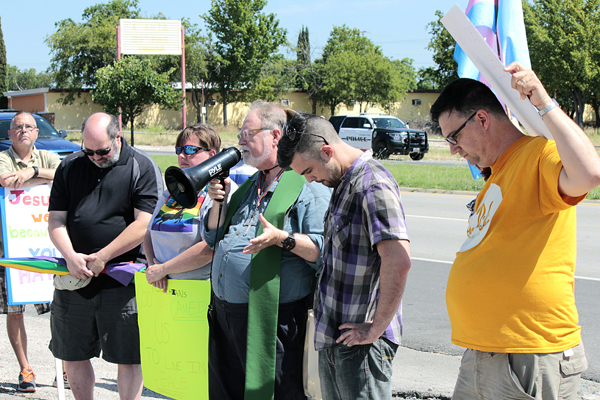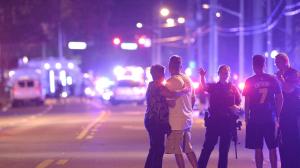LGBT Community Protests Extremist Hate Speech After Orlando

I AM DONE protestors stand against religious bigotry and hate speech on June 26 to declare that “Love Beats Hate.” I AM DONE Facebook photo.
Samsom Park, Texas – A fundamentalist pastor west of Fort Worth carried hate speech and religious intolerance of LGBTQ people to a new low in the wake of the Orlando Pulse Nightclub Massacre. Donnie Romero, leader of Stedfast Baptist Church, a small, independent, exceedingly angry group, stirred opposition by declaring that the cold blooded murder of LGBT people in Orlando, Florida on June 12 was God’s judgment upon the victims.
In starkly bigoted language, Romero went on to declare that his only regret about the massacre was that no one had finished what the shooter had started. Anticipating that members of the LGBTQ community might picket his small storefront church, Romero publicly declared that since members of his church were Texans who had weapon permits, protestors just might get shot.
The Rapid Response group, I AM DONE, organized a protest of Romero’s religious bigotry and carried out the direct action across the highway from Stedfast Baptist Church on Sunday morning, June 26. An estimated 50 protestors from across North Texas, protected by police from four local municipalities including Sansom Park, where the church is physically located, Lake View, Lake Worth, and Fort Worth, sang, chanted call-and-response, waved signs proclaiming Love, and read the names of the Orlando victims through a bullhorn during the church hour. The Texas heat was oppressive, but the protest was deemed successful since Romero’s hate speech had been answered forcefully but peacefully.
The following are the remarks Rev. Dr. Stephen V. Sprinkle of Brite Divinity School delivered at the protest, entitled: “Lament, Discover, and Repair.”
The Orlando massacre has forced America to stare into the abyss of our broken society. We have recoiled from what we have seen: not only the brutality of fear and loathing that took so many lives at the Pulse nightclub that night, but also the sickening complicity of a national culture that has set up the conditions for the slaughter of our people for generations.
Our feelings of remorse and loss are real and sharply painful; our burning anger is hot and real, as well.
But we cannot allow the abyss of race hatred, misogyny and heterosexist privilege to paralyze us with fear or anger — not again!
If others must continue the endless finger-pointing, let them. Not us, not again, not now!
We have a gaping hole in the American character to fix, and it will take all of us to do it, queer folk of faith, faith-free queer folk and allies alike. The spiritual resources that belong to American LGBTQ people are at hand, and we must discover how to use them to heal our broken hearts, our troubled minds, and to repair the ruins that yawn up at us from the abyss that bears so many names:
Orlando
Mother Emanuel A.M.E.
Sandy Hook Elementary
The Upstairs Lounge Inferno
Wisconsin Sikh Temple
Sixteenth Street Baptist Church
Aurora, Colorado, and
Virginia Tech, and more.

The Rev. Stephen Sprinkle of Brite Divinity School, flanked by other ministers, ended the protest with prayer. Other ministers attending included Chaplain Aaron Burk, the Rev. Mark Weathers of University Christian Church, the Rev. Heather Dunham of Universal Life Church, and the Rev. Russell Dalton with Brite Divinity School. Tammye Nash, Dallas Voice photo.
We must act according to the sources of our power, no matter what makes us afraid. The practice of lament clears the spiritual space that makes effective action possible.
Sadness can empower our souls as well as dis-empower them. We can erect shrines that tie us to the past, or we can discover the power to lament as a people until hope takes the place of despair.
Phyllis Trible, the ground-breaking author of Texts of Terror who told the stories of the wrong done to biblical women, has said that mourning alone changes little. But true change comes from insight, a change that can inspire individuals and even a whole generation to repentance.
She writes: “In other words, sad stories may yield new beginnings.”
God knows, we have sad stories, and plenty of them. What we must find is the courage to cry out in public acts of lament that change despair into hope.
Rabbi Denise Eger, lesbian and president of the Central Conference of American Rabbis, shows us how to turn sorrow into a new kind of power for good:
“Sister that I never held near,
Brother that I never embraced, our memory is almost lost:
The one we don’t talk about.
The loving one who never married.
The one for whom no Kaddish was said.
Your loneliness calls out to me:
I know of your struggles, we are not strangers,
And if my path is easier, I will not forget who walked it first.
We call you to mind, but did you not sometimes think of us,
Your children, lovers across the years,
Those who would follow and would think of you and bless your memory
And call you to mind?
With David and Jonathan, we will not forget you,
With Ruth and Naomi, we will not forget you,
In the name of God you are our sisters and our brothers, and we ask that you be remembered for peace.”
When we cry out to God from the depths of our collective sorrow, as my friend, Dean Joretta Marshall, of Brite Divinity School says, we begin to discover new possibilities for memory, compassion, empathy, and vision.
As we collaborate publicly in acts of lament when we are overwhelmed, we discover new ways to collaborate together in “life-giving hope.”
Protests are important, but they do not capture the spiritual power of crying out together so that our despair may turn into hope, and inspiration gives our activism fresh ideas to address the venom the LGBTQ community faces, much of it inflicted in the name of religion.
Sorrow is not a destination. We need movements, not monuments or shrines, movements of “life-giving hope.” So, together, before all the world, with our enemies included, we cry out until despair begins to transform into something new.
We remember before God the tens of thousands of our LGBTQ family martyred in years gone by. We remember those who died in the Inquisition, the Middle Passage, the Witch Craze, the Holocaust, and the struggle for civil rights.
We refuse to forget those, driven to despair by a world that hated them and who they loved, who took their own lives rather than face any longer the intolerable.
And we cannot forget those who lived out their days lonely, repressed, and afraid to reach out for affection and comfort, too hurt to give or receive the love they craved.
To us, in the memories we share in our seasons of lament, they have all become the martyrs of God, signs that we must make the world better than they found it. In the name of love, we pray, “O God, remember the sacrifices of these martyrs, and help us to bring and end to hate and oppression of every kind!”
We say and we believe that “Love Wins!” But in the struggle to repair the world, we have learned that love must be ferocious to win the new world we seek for ourselves, our children, and for everyone.
The story of the struggle for our human rights has lessons to teach, and one of the undeniable lessons of our history is that LGBTQ people have never been “given” anything. The heterosexist society in which we live never surrenders its power willingly. Our freedom has had to be won.
If our great theme is LOVE, from the right to love the one we choose, or the love of country that inspired us to defy Don’t Ask, Don’t Tell, to the love of human life itself because we are a people who are represented everywhere — in every group and race, and in every known social demographic from the beginning of recorded history — then we know from our own collective experience that love must be fierce in order for it to survive.
There is something divine in love like that, a divine imperative that will not be forestalled any longer, or postponed, or sidetracked. From the days of our forebears in the 19th century, we began to network across the boundaries of nations, to count the ever growing number of ourselves, and to realize that we were a powerful people united by a new sense of the possibilities of love.
Today, we are strengthened by amazing allies from every walk of life who understand that their future and ours are bound up with us in a contest to determine whether diversity and pluralism will prevail in our world, or whether patriarchal fear of immigrants, gender non-conformity, non-Caucasian people, and non-Judeo-Christian faiths — fears intensified by the rejection of the leadership gifts of women — will drag us backward.
Our most powerful ally in LGBTQ history, President Barack Obama, has shown us what a love with real backbone looks like. Like many of our allies, the president had to evolve in this thinking about what justice and equality for LGBTQ people called him to do. Once he got there, to the place of true equality and justice, he became our full-throated advocate.
His spiritual mentor, Dr. Martin Luther King Jr., taught him to face challenges with “the fierce urgency of now.” We LGBTQ people found that vision to resonate powerfully with our experiences of struggle beyond any counted cost, and, inspired by President Obama, we have recast Dr. King’s idea in our own way. We serve a vision inspired by “the fierce urgency of love.”
“The fierce urgency of love”:
Love that refuses to be anemic in the face of hard times.
Love that has a spine, and bows before no opponent.
Love that will not back down, and will not back up.
Love that knows how and when to get loud and be proud.
A love where Everybody is Somebody, and nobody is a nobody.
Our activism at its best is motivated by the fierce urgency of a love that will not permit churches, synagogues, and mosques to remain silent on the sidelines of the struggle for justice, for silence in the face of injustice is its own form of spiritual violence.
The fierce urgency of love compels us to give no free passes when religious leaders of any stripe breathe out venom and hatred toward marginalized people. That is why we oppose religious intolerance to the same degree we oppose political and economic harms done to LGBTQ people in North Texas and anywhere else.
We have learned the lessons of ferocious love: that hate speech from any pulpit or from any rostrum in a governmental chamber is the ammunition that kills and maims real people, as surely as any bullet. We cannot permit any leader to hijack religion and force it into the service of oppression of any kind any longer without our calling out such an outrage.
As Rev. Dr. Cody J. Sanders, the pastor of Old Cambridge Baptist Church near Harvard Yard, a proud gay man says:
“For LGBTQ people, the mechanisms of oppression have nearly always been waged first against our souls. But it never ends there. This spiritual violence has led to innumerable suicides, hate crime violence beyond what we know through the collected statistics, and the marginalization of LGBTQ people in the very institutions they should feel most at home: their families, their churches, and their communities.”
Sanders calls for spiritual reparations for the harm done to the souls of LGBTQ people, a fierce love of God and neighbor that seeks to heal the hurt and repair the broken world. Like Sanders, in the name of love, we must fiercely call for real and practical actions:
For LGBTQ homeless youth in our cities,
For effective ways to prevent LGBTQ suicides,
For funding for LGBTQ seminarians so that they can become faith leaders throughout America,
For the recruitment of qualified LGBTQ candidates to run for public office,
For literacy in LGBTQ life and history, and engagement between established cisgender and straight clergy with queer leaders in their communities, and especially
For churches and religion-based non-profits to stand up to their denominations and parent organizations when they participate in anti-LGBTQ discrimination by thought, deed, or silence.
Sanders concludes with the forthright demand of a community that knows how to stand tall and true, and has the courage to repair a broken world even in the face of spiritual opposition:
“Churches owe LGBTQ people a spiritual debt,” he says, “for the decades upon decades of violence against our souls. It’s time to start paying up.”
The Hebrew prophets sounded like that, didn’t they? That is an important dimension of the spiritual heritage of the LGBTQ human rights movement that was first born and nurtured in churches and synagogues in the pre-Stonewall era, and right up until this very day.
I work alongside lesbian, gay, and straight colleagues of courage at Brite Divinity School in Fort Worth, who like Cody Sanders, want to transform the world in which we live. So, with the whole Cloud of Witnesses, from the time of the Hebrew Prophets, Jesus of Nazareth, and the Prophet Muhammad, to the millions of LGBTQ people and our allies right here and right now, together with the Prophet Isaiah, we say:
Is not this the fast that I choose:
to loose the bonds of injustice,
to undo the thongs of the yoke,
to let the oppressed go free,
and to break every yoke?
Is it not to share your bread with the hungry,
and bring the homeless poor into your house;
when you see the naked, to cover them,
and not to hide yourself from your own kin?
Then your light shall break forth like the dawn,
and your healing shall spring up quickly;
your vindicator shall go before you,
the glory of the Lord shall be your rear guard.
Then you shall call, and the Lord will answer;
you shall cry for help, and he will say, Here I am.
Our greatest asset as a Queer/LGBT community, you see, lies in far more than our numbers, our economic strength, and our political allies. It lies in our spirituality of collaborating hope, hope forged in the furnace of our tests and trials, made powerful by the vision of a better world than we have ever known.
Our enemies are real. Their guns and their words spit fire and death. They misunderstand, sometimes with lethal consequences, who we are and what we contribute to the common world in which we all dwell.
But we know wherein our power truly lies, for as our Sister Outsider, Audre Lorde, taught us, “When I dare to be powerful, to use my strength in the service of my vision, then it becomes less and less important whether I am afraid.”
Rise up, then!
We LGBTQ people were never meant to settle into paralysis, depression and despair on the far side of the pit our adversaries dug for us. It is time to build a bridge across the abyss that swallowed up our Orlando sisters and brothers. Bring your energies, your tools, and your resolve. We have at hand the resources of a rich spirituality, and a fierce, divine love.
There is a world to repair.



 Summer 2009 – Dr. Sprinkle responded to the Fort Worth Police Department and Texas Alcoholic Beverage Commission Raid on the Rainbow Lounge, Fort Worth’s newest gay bar, on June 28, 2009, the exact 40th Anniversary of the Stonewall Rebellion. Dr. Sprinkle was invited to speak at three protest events sponsored by Queer LiberAction of Dallas. Here, he is keynoting the Rainbow Lounge Protest at the Tarrant County Courthouse on July 12, 2009.
Summer 2009 – Dr. Sprinkle responded to the Fort Worth Police Department and Texas Alcoholic Beverage Commission Raid on the Rainbow Lounge, Fort Worth’s newest gay bar, on June 28, 2009, the exact 40th Anniversary of the Stonewall Rebellion. Dr. Sprinkle was invited to speak at three protest events sponsored by Queer LiberAction of Dallas. Here, he is keynoting the Rainbow Lounge Protest at the Tarrant County Courthouse on July 12, 2009. 

